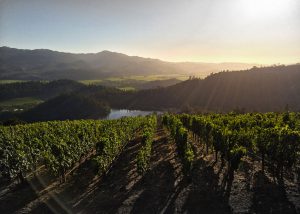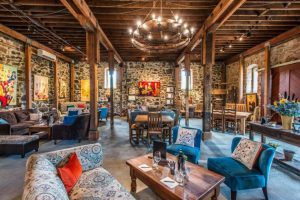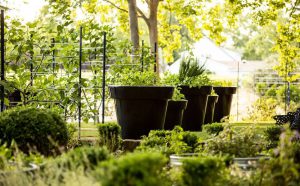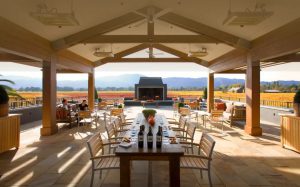

The stone barn winery, built in 1886. (Courtesy of Ehlers Estate)

The culinary garden at St. Supery Estate.(Courtesy of St. Supery Estate)

The three-story wooden winery at Trefethen, built in 1886. (Courtesy of Visit Napa Valley)

The patio at Round Pond Estate (Courtesy of Visit Napa Valley)
The Green Wine Trail: 10 of Napa's Most Sustainable Wineries
What could make sipping a delicious glass of wine in beautiful Napa County even better? Knowing that the wine isn't only good on your palate, but is also good for the Earth.
Luckily, that type of eco-friendly experience is easy to find in Napa, an area with a long history of treating the environment right. Fun fact: This May marks 50 years since the county became the nation’s very first “agricultural preserve,” which essentially paved the road (pun intended) for the area to remain as beautiful as it is today, rather than run over with development.
Thanks to that bold law, we still get to revel in our beloved Napa scenery, with its stunning rolling hills, picturesque meadows, and lush forests. Today, many of Napa’s vintners remain not only committed to, but on the cutting-edge, of taking care of the land through sustainability initiatives. In fact, nearly one-quarter of the county’s 500 wineries are now certified through Napa Green, an environmental certification program that recognizes vineyards for their environmentally savvy operations, from soil to bottle. To guide visitors wishing to support these sustainably minded wineries, the org has even compiled some sample wine tasting itineraries, each with three wineries and organized by region as well as theme (such as Art & Architecture and Bees & Bocce)
We’ve had the opportunity to explore several of Napa’s greenest vineyards. Here are 10 of our favorites.
At this incredibly charming 42-acre vineyard in Saint Helena, sustainable and socially responsible practices permeate nearly every aspect of its operation. For starters, the vineyards are 100 percent organic—no small feat—and winemaker Kevin Morrisey is passionate about all of the work that goes into getting that certification throughout the estate, from the greenhouse to the chicken coops to the vines. He takes a holistic approach to farming according to the biodynamic teachings of Rudolf Steiner. As for the tasting experience, it’s refreshingly chill for Napa, taking place inside an old stone barn built in 1886 and full of eclectic vintage furniture, a rotating art gallery, and a bocce court out back. Kick off a visit to Wine Country right by visiting this locale in the morning for the “Start Your Day” tasting, which includes a freshly baked Bouchon Bakery croissant and an intimate tour of the property for $50. // Tastings start at $35/person (appointments preferred); ehlersestate.com.
Making the commitment to third party certification takes time and effort, but it is worth it to demonstrate our commitment to the community and to protect our watershed, our land and the air we breathe.
- Susan Boswell, Chateau Boswell Winery
